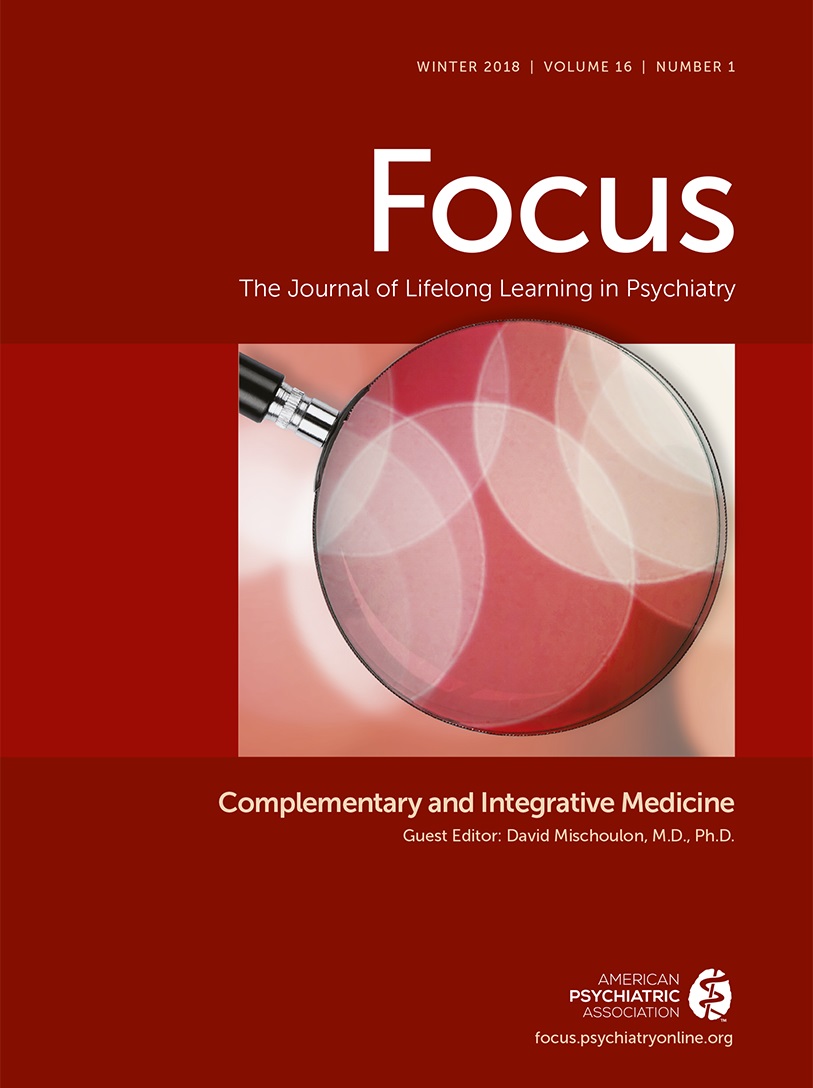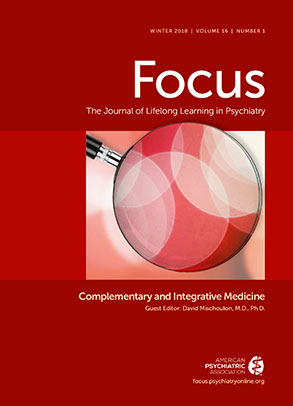Meditative movements (such as Qigong or Tai-Chi) are widely practiced not only to improve general health but also to manage mood and improve psychological well-being. In recent years, people have increasingly been using Qigong and Tai-Chi as complementary and alternative therapies to manage psychological stress and mood. However, many of these studies recruited patients with chronic physical illnesses and healthy people, and only a few studies targeted patients with anxiety disorder or depression. A summary of these studies’ findings is presented next.
Clinical Evidence on Qigong
An increasing number of studies have demonstrated the effectiveness of Qigong exercise in helping people reduce anxiety and depressive symptoms and improve psychological well-being. The effect of Qigong has been found to be comparable with that of cognitive-behavioral therapy in significantly reducing depressive symptoms among outpatients with clinical depression (
59) and adults with depressive symptoms (
60). Compared with walking or conventional exercise, one study suggested a beneficial effect of Qigong exercise in reduction of depressive symptoms among women with perimenopausal syndrome and depression (
61), and another study showed that Qigong and conventional exercise have similar effects on reducing depressive symptoms among patients with hypertension and depression (
62).
In two studies, the Qigong group had significant reduction in depressive symptoms among older adults with depression and a chronic medical illness when compared with a control group who read the newspaper together (
63,
64); the Qigong group also had significant reduction in depressive symptoms among patients with type 2 diabetes mellitus when compared with people in the control group who received education and performed stretching (
65). When compared with a waitlist control group, some studies have demonstrated favorable effects of Qigong on reducing depressive symptoms among persons with chronic fatigue syndrome-like illnesses (
66,
67), type 2 diabetes mellitus (
68), subhealth problems (
69), and Parkinson’s disease (
70). Two studies showed that there were no significant beneficial effects of Qigong for patients with burnout using basic care as a control (
71) and for older adults with chronic physical illnesses using traditional remedial rehabilitation activities as a control (
72).
Compared with depressive symptoms, few studies have been performed on the effects of Qigong on anxiety symptoms. There is evidence suggesting that Qigong could alleviate anxiety symptoms among people with subhealth problems compared with a control group (
69). However, Qigong showed no significant benefits among people with mild essential hypertension when compared with conventional exercise and among people with burnout when compared with basic care (
62,
71).
Existing systematic reviews have documented the clinical evidence of the beneficial effects of Qigong exercise on depressive and anxiety symptoms among patients with chronic diseases (
73–
75). A meta-analysis study that reviewed 12 randomized controlled trials (RCTs) (
73) suggested that Qigong exercise has beneficial effects on depressive symptoms when compared with a waitlist control group or a usual care only group. However, available evidence does not suggest beneficial effects of Qigong exercise on anxiety symptoms. Another meta-analysis study (
74) based on patients with type 2 diabetes suggested that Qigong was effective in reducing depression and anxiety. Oh et al. (
75) performed another systematic review of Qigong that suggested potential effects of Qigong exercise in the treatment of depression. The three reviews described earlier in this paragraph reported that Qigong was beneficial for the management of depressive symptoms. A review of Qigong exercise in healthy adults by Wang et al. (
76) suggested that Qigong exercise may reduce stress and anxiety.
The inconsistent results of the effects of Qigong in these reviews are probably due to the great heterogeneity of participants, wide spectrum of outcomes, different measurements for depression and anxiety, and different types of control groups. These reviews involved diverse participants, including healthy individuals, individuals with depression, and individuals with chronic diseases, and a wide spectrum of outcomes, including mood, anxiety, depression, psychological well-being, self-efficacy, and quality of life. The depression symptoms were measured by a variety of measurement scales, making comparison across studies difficult.
In addition to depressive and anxiety symptoms, we found that Qigong exercise was also associated with significant improvements in general health (blood pressure, bodily pain, gastrointestinal health, dynamic balance, right-hand grip strength, fatigue, and sleep quality), psychological health (concentration, memory, burnout, and self-efficacy), social relation, and health-related quality of life (
59,
62–
64,
67,
69,
71,
72,
77–
79).
A previous study reported that a decreasing trend of salivary cortisol level was observed following Qigong intervention, but there was no significant change for the blood serotonin level (
63). Qigong was found to increase melatonin level, enhance cellular function of neutrophil and natural killer cells (
80), and reduce inflammation among cancer patients (
79). Studies on chronic fatigue syndrome indicated that Qigong exercise may reduce salivary cortisol and enhance telomerase activity in the blood, suggesting the regulation of HPA activity and antiaging effects of Qigong exercise (
78,
81). A recent animal model has demonstrated the significant role of adiponectin in mediating running-triggered enhancement of hippocampal neurogenesis and in alleviating depression (
82). The findings of a study on women with chronic fatigue syndrome-like illness echoed the above findings in mice, indicating that Qigong exercise significantly reduced depressive symptoms and improved the levels of adiponectin and that adiponectin might contribute to the antidepressive effects of Qigong exercise (
83).
Clinical Evidence on Tai-Chi
A growing body of clinical research has investigated the effects of Tai-Chi for a variety of health issues. Tai-Chi has been shown to have significant effects in reducing depressive symptoms in fibromyalgia (
84), knee osteoarthritis (
85), and rheumatoid arthritis (
86) compared with wellness education and stretching, and also in rheumatoid arthritis (
87) when compared with an attention control group (education on nutrition and medical information). In a systematic review, nine RCTs and four nonrandomized comparison studies examined the effects of Tai-Chi on depression, education, routine activity, and other forms of exercise by using self-comparison among individuals with rheumatoid arthritis, osteoarthritis, fibromyalgia, and depression; women with sedentary lifestyles and obesity; Chinese older adults with cardiovascular disease risk factors; and healthy adults. Only two studies investigated participants with clinical depression. The overall findings suggested that Tai-Chi exercise had significant depression-reduction effects compared with various control groups (
88). In the same review, a meta-analysis based on two RCTs and six nonrandomized comparison studies, including healthy adults, patients with symptomatic osteoarthritis, older adults with cardiovascular disease risk factors, adolescents with attention-deficit hyperactivity disorder, and individuals with fibromyalgia, reported that Tai-Chi was associated with a significant reduction in anxiety (
88).
Another recent review including 37 RCTs demonstrated that Tai-Chi interventions have beneficial effects for various populations on a range of psychological well-being measures, including depression, anxiety, stress and mood disturbance, self-esteem, and exercise efficacy (
89). An earlier review of 13 studies also showed that Tai-Chi appeared to be most significant on depression (nine studies), anxiety (six studies), and mood (four studies) (
90). Interestingly, a systematic review comparing the effects of Qigong and Tai-Chi on depressive symptoms suggested that Qigong appears to be beneficial for reducing depressive symptom severity, but no significant effects were seen for Tai-Chi (
91).

